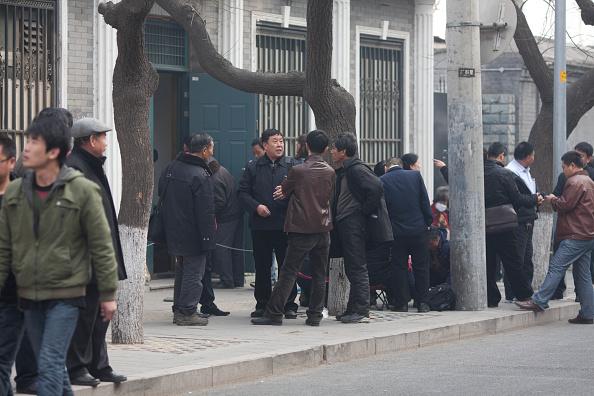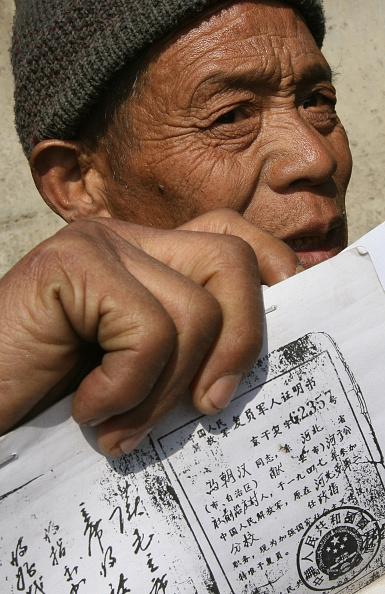Major Protests
The Epoch Times obtained a document from the municipal government in Dandong city, Liaoning Province.On May 31, 75 veterans from local companies in Dandong gathered at the municipal government office complex and appealed to the authorities by holding up banners, kneeling on the ground, and sitting quietly.
On June 11, over 110 veterans protested in front of the city’s Railway Station Square to appeal for their rights—a few protesters delivered speeches, while many were seen holding up banners and sitting quietly.
On June 12, around 230 veterans protested in front of the provincial government complex.
Despite the peaceful protests, Chinese authorities were concerned about the number of protesters at the demonstration sites. The report claimed that “the retired military personnel got an opportunity to unite, exchange information, learn from each other, and increase their influence, creating multiple negative impacts on future stability maintenance and reconciliation work.”

Veteran Petitioners are Well-organized
The report noted that the number of veterans at protest sites were increasing and the petitioners were well-organized.The group “has a tendency to intensify [the situation] and won’t stop until their goal is achieved,” it said.
According to the document, the petitioners have strong ties among themselves and with other similar groups, and these veterans are well organized at the petition sites because they are divided into different teams. It said that there are seven groups of veterans over the social media platform WeChat, with nearly 400 members.
The report said the group works quickly and is able to evade the monitoring and tracing by the police. The petitioners frequently change cell phone SIM cards that are not registered under any real name. They intentionally take a detour and travel in private cars or trucks to get to their petitioning destinations under the cover of darkness.
Hsin-Hsien Wang, a Taiwan expert on China affairs said that the main reason for this high level of mobilization is that various veteran organizations have been set up by local veterans to facilitate communication—these organizations include the Chongqing Disabled Veterans Organization Committee, Guizhou War Veterans, Henan Revolutionary Disabled Veterans’ Rights, Shaanxi August 1 Veterans, and Hebei War Veterans. He noted that these networking groups are widespread at the city, county, and provincial levels. Some of the groups are established at the national level such as the National Association of Veterans of the Two Participations and the National Veterans United Association.
Suppressing Veterans
According to the report, the then-Secretary of Dandong Municipal Party Committee was frustrated at the situation: “The city has sent two Standing Committee members to Shenyang to work [on controlling the petitioners], and more than 100 county or district leaders and police officers participated in the work, but why wasn’t this [sending people to Shenyang to control the petitioners] reflected [in the report]?”The report listed suggestions for future “stability maintenance” work related with veteran petitioners, including setting up special organizations that are responsible for veteran groups; strengthening the collection of personal information of all the military veterans, targeting the leaders and organizers by alienating them from the group, “implementing humane care” to appease the veterans in order to prevent them from petitioning.
According to the document, there are 2,114 veterans working in the city’s enterprises, of which 288 veterans were laid off—that is the main reason why they have frequently petitioned for their benefits.

The CCP Uses Both Hard and Soft Measures to Control Veterans: Expert
Hsin-Hsien Wang, a professor at the Graduate Institute of East Asian Studies of the National Chengchi University (NCCU) in Taiwan once wrote in an analysis, “Veterans have a variety of qualities that scare the [CCP] government.”In the past two decades or so, military imposters paid for a veteran status to get access to good job placements and veteran-related benefits, and various government departments and hospitals were involved in providing them with fake identity documents. This indirectly impacts the benefits of true veterans, according to Wang.
The petitioning and protesting veterans have demonstrated astonishing mobilizing capabilities, Wang wrote in his analysis.
“These veterans came from at least nine provinces and cities, and the timing of the event was very sensitive, as it coincided with the annual Xiangshan Forum attended by official delegations and military experts from nearly 60 countries, and the eve of the 18th Plenary Session of the 6th Central Committee of the Communist Party of China,” Wang wrote.
Wang noted that the large-scale veterans’ mobilization is mirrored by other groups.
“It is of concern that this kind of mass mobilization is not only happening to veterans, but also to truck drivers who went on strike in June [2018],” he said.
To maintain stability, the local governments use harsh measures to suppress the petitioning veterans, Wang said. This includes deploying police or security personnel equipped with heavy weapons; censoring online media and deleting social media posts, closings roads and shutting down train services, and using drones to monitor protest sites.
The soft measures include payments of benefits and improvements of veterans’ incomes. But local governments have failed to carry out these measures. And when veterans complain, authorities respond with draconian measures, he said.
“It is expected that the ‘rights defense’ of veterans will be a huge challenge and a sensitive issue for the CCP,” Wang concluded in his analysis.





